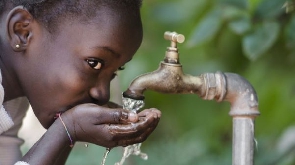A recent report by the Ghana Statistical Service (GSS) has revealed that in urban areas, approximately 1.4 million households lack access to water within their premises.
It means that around 27.7% of households in urban areas lack on-premises access to their main source of drinking water.
This was contained in the 2021 Population and Housing Census (PHC) General Report on Water and Sanitation by the service.
In a news report by graphic.com.gh, out of the stated number of households, 89,922 of them had to travel more than 30 minutes to reach their primary source of drinking water and return.
Also, nationally, 112,031 urban households were reported to use unimproved sources of drinking water, which are defined as sources not sufficiently safeguarded against external contamination.
The report gave a regional breakdown of the situation.
The North-East Region recorded the highest proportion of households (24.0%) in urban areas using unimproved sources of drinking water, significantly surpassing the national urban average of 2.2%.
The Northern (10.0%) and Savannah (9.3%) regions also had considerable percentages of households using unimproved sources in urban areas.
Open defecation was another significant concern, with almost half a million (449,849) urban households practicing open defecation and 1.3 million using public toilet facilities.
The North East and Savannah regions had the highest rates of open defecation among urban households, exceeding five times the national urban average of 8.9 percent.
Regarding housing conditions, the report indicated that over a quarter-million (316,116) urban households lived in uncompleted buildings (79,721) or unconventional structures (236,395), including wooden structures, kiosks, and metal containers, among others.
The Greater Accra Region had the highest proportion (11.9%) of households living in uncompleted buildings or unconventional structures compared to other regions.
Meanwhile, World Cities Day is observed on October 31 each year to bring attention to the challenges encountered in urban areas.
Ghana’s leading digital news platform, GhanaWeb, in conjunction with the Korle-Bu Teaching Hospital, is embarking on an aggressive campaign which is geared towards ensuring that parliament passes comprehensive legislation to guide organ harvesting, organ donation, and organ transplantation in the country.
WN/SEA
You can also watch the latest episode of Everyday People on GhanaWeb TV below:
General News of Tuesday, 31 October 2023
Source: www.ghanaweb.com

















